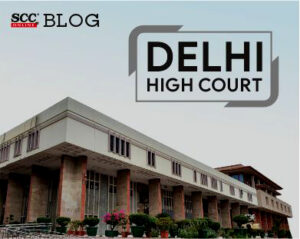Delhi High Court: In an appeal filed by Supertech Realtors against the order of Single Judge in relation to payment of dues by the real estate developer to a consortium of banks, the Division Bench of Satish Chandra Sharma, CJ. and Subramonium Prasad, J. rejected the appeal and held that Supertech Realtors cannot ask for alteration of the contract by filing writ petitions under Article 226 of the Constitution.
Background
The appellant was a part of Supertech Group, which was a real estate developer, and the appellant approached the consortium of banks led by Union Bank of India and consisting of Bank of Maharashtra, Central Bank of India, Oriental Bank of Commerce seeking financial assistance for a project called ‘Supernova’. A financial assistance of Rs. 735 crore was agreed to be lent by the consortium of banks, and a sum of Rs. 678.22 crore was disbursed. It was stated that a term loan of Rs.150 crores was also sanctioned by the consortium of banks.
The appellant was unable to repay the loan sanctioned by the consortium of banks and the account of the appellant was classified as Non-Performing Asset (NPA) in 2018. A One-Time Settlement (OTS) was entered after four years in 2022 for Rs. 121.43 crores. The Appellant sent a letter wanting an amendment to the OTS and the amount was further reduced from Rs. 121.43 crores to Rs. 120.94 crores. Under the amended terms, the sum of Rs. 9.16 crores had been received in the loan account through RERA cut back and the balance amount of Rs. 111.78 crore was to be paid in 24 instalments of Rs. 4.66 crores after a three-month moratorium from the date of conveying of original sanction to the borrower. Thereafter, a dispute arose between the bank and the appellant stating that the appellant defaulted on the payment of monthly instalments of Rs. 4.66 crores each, which was not paid even after sending letters to the appellant. Appellant challenged the letters and submitted that the amounts were not due and payable.
Analysis, Law, and Decision
The Single Judge dismissed the writ petition stating that the writ petition seeks for alteration of the terms of the contract which could only be done by way of mutual consent in terms of Section 62 of the Contract Act, 1872 (Act). It was contended before the Single Judge that the three months moratorium period was calculated wrongly and should have been calculated from the date of the original OTS. The Single Judge had rejected this contention stating that the three months moratorium was to be calculated from the date of conveying ‘original sanction’ to the borrower.
The Court opined that it did not find any infirmity with the order of the Single Judge and the amended terms of sanction made it clear that the amount of Rs. 111.78 crores had to be paid in 24 instalments after three months of moratorium from the date of conveying original sanction to the borrower and the appellant made the default in not paying the first installment.
The Court held that the Single Judge had rightly observed that the writ petition in the present case was an attempt at renovation of contract which could not be permitted in a writ petition. The Court relied on Orissa State Financial Corporation v. Narsingh Ch. Nayak, (2003) 10 SCC 261, where it was held that “no doubt, while exercising its extraordinary jurisdiction under Article 226 of the Constitution, the High Court has wide power to pass appropriate orders and issue proper direction as necessary in the facts and circumstances of the case and in the interest of justice. But that is not to say that the High Court can ignore the scope of the writ petition and nature of the dispute and enter the field pertaining to contractual obligations between the parties and issue such directions annulling the existing contract and introducing a fresh contract in its place”.
The Court held that “the OTS which has been entered into between the consortium of banks and the appellant was purely a contract and a borrower cannot ask for alterations of the same by filing petitions under Article 226 of the Constitution of India. The terms can be altered only through mutual consent between the parties”.
[Supertech Realtors (P) Ltd. v. Bank of Maharashtra, 2022 SCC OnLine Del 4198, decided on 29-11-2022]
Advocates who appeared in this case:
For the Appellant: Senior Advocate Maninder Acharya;
Advocate Ishan Dewan;
Advocate V. Siddharth;
Advocate Viplav Acharya;
Advocate Udita;
Advocate Priyal Bopana;
For the Respondent: CGSC Monika Arora;
Advocate Nishant Awana;
Advocate G.S. Awana;
Advocate Yash Tyagi;
Advocate Shivam Raghuwanshi.

